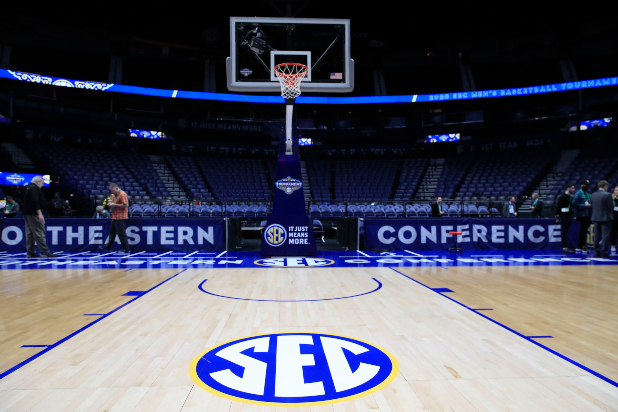A World Without Sports: TV Networks Brace for Billion-Dollar Losses During Coronavirus Pandemic – The Wrap

|
Getting your Trinity Audio player ready...
|
SOURCE: Tim Baysinger | The Wrap
The coronavirus pandemic brought the sports world to a screeching halt this week, and the networks that paid billions of dollars for the right to televise those games are bracing for impact.
And nobody knows how far and wide this financial hit will be during an unprecedented time when uncertainty has become the normal operating procedure. But this much is a sure thing: A spring without any live sports would cost networks like ESPN and TNT millions of viewers and billions of dollars.
The next few months alone feature March Madness, the NBA and NHL playoffs, The Masters golf tournament and the first pitch of the MLB season. If you stretch this into June, it will include the NBA and Stanley Cup Finals. (We won’t even get into the financial hit NBC would take if July’s Tokyo Olympics were called off.) It should be noted that while March Madness was completely canceled, everything else has been suspended or postponed, which makes figuring out the total impact a fool’s errand.
Everyone is in a holding pattern and waiting on the leagues for guidance.
But the NCAA Basketball Tournament, which was scheduled to begin next Tuesday, will hit both CBS and Turner in the wallet. Last year’s tournament brought in $910 million in ad revenue for CBS and Turner, who jointly present the three-week event and split the revenue equally. They’ll also incur ratings losses as they have to shuffle in re-runs: CBS is airing repeats of primetime series like “Young Sheldon” and “FBI” in its place.
When it comes to the NBA, it’s harder to gather just what the financial impact will be because we don’t know when, or if, the games will resume. The NBA was the first to halt its season after one of its own players tested positive for COVID-19 (Utah Jazz’s Rudy Gobert), the official name of the coronavirus. By Friday, all major sporting events around the world, including the English Premier League, had been called off.
Even if the games resume, the next month or so will be hard to swallow, with ESPN obviously seeing the biggest impact. According to estimates from MoffettNathanson, NBA coverage accounted for 11% of the time people spent watching ESPN in 2019, and accounted for 21% of its ad revenue, totaling $640 million. If the rest of the season were to get called off, MoffettNathanson estimates that ESPN’s parent company, Disney, would lose $481 million in ad revenue, when factoring in the losses ABC would incur for not airing playoff games or the NBA Finals.
For TNT, which had NBA coverage make up 18% of its total time viewed last year, it would take a $210 million hit if the coronavirus wipes out rest of the season.
As far as programming, ESPN is taking it on a day-by-day basis and has only mapped out a plan through Sunday. The network is expected to have a long-term programming strategy by next week, according to an industry source. Any advertisers that booked ad time for upcoming NBA games will have the option of running alongside the replacement programming, moving to another Disney network or just waiting to see what the NBA advises, the source added.
ESPN declined to comment further on its plans, while a representative for Turner did not immediately respond to TheWrap’s request for comment.
The NBA gets more than $2.6 billion annually from Disney and WarnerMedia. March Madness’ current rights deal is for 14 years and $10.8 billion through 2024, which average out to $770 million a year. And it’s not exactly clear if the networks will get to recoup any of that, mainly because this is such a unique situation. Even analysts are unsure.
“[It] depends on each underlying contract and the definition of that contract,” MoffettNathanson’s senior research analyst Michael Nathanson said this week. “It is too soon to make a declarative statement as many of the networks appear to be reviewing their options.”
Rich Greenfield, of LightShed, said it was likely the situation would be handled similar to a work stoppage.
“As has been the case during lockouts, we believe NBA media rights holders still must pay the NBA rights fees, even if games are not aired,” he said in a research note, adding that the NBA is required to make its media rights owners “whole” (i.e. making sure they get back any lost value) over the length of the contract, which in this case extends through 2025. “The league makes its media rights owners whole for both lost ad dollars and lost affiliate fees. However, these calculations are complicated and may take a good deal of time for all sides to agree upon,” he added.
It gets dicier when you get to the Regional Sports Networks, which rely even more on broadcasting their local teams’ games. Both national and regional networks are also required to air a certain percentage of their games or they’re in jeopardy of having to give back fees they make from cable and satellite operators. Greenfield states that, while they’re probably not in jeopardy in that regard with the NBA and NHL since both were nearing the finish line of their seasons, the MLB season is a different situation.
“If a meaningful portion of the MLB season is canceled (hard to push the season later due to weather), that could actually put affiliate fees in jeopardy, especially for the RSNs,” he said.
The long-term impacts could be felt even after the games resume. As other live events see their ratings decline, sports has been the last pillar keeping the legacy TV model upright. Without any games, viewers may choose to invest their dollars into paying or at least sampling more streaming services to keep them entertained.
“While we do not expect consumers to rush to cut the cord immediately, a prolonged sports outage could lead to a meaningful acceleration in cord-cutting,” Greenfield warned.


